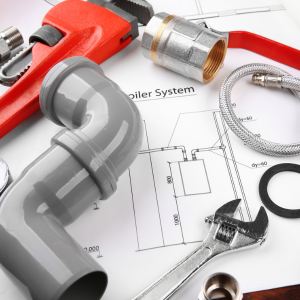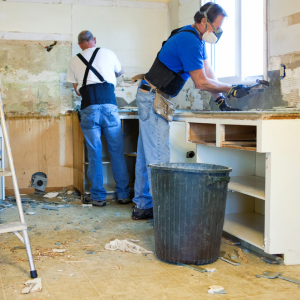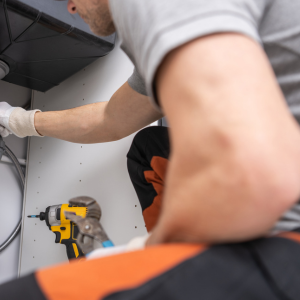
The cost to replumb a house in Pennsylvania varies significantly, starting from $0.40 per foot for repiping to $4.50 per square foot for complete plumbing replacements. Homeowners should consider factors like pipe material, local plumbers’ rates, and the complexity of the project to determine the total cost accurately.
What Factors Affect the Cost to Replumb a House in Pennsylvania?
How does house size impact replumbing costs in Pennsylvania?
The size of your Pennsylvania home determines its repiping cost. Larger homes require more pipes, which increases costs. 1,500-square-foot homes cost less to re-plumb than 3,000-square-foot homes. This is because larger spaces require more labor and materials. Important cost factors:
- House size in square feet
- Number of floors, kitchen, and bath fixtures
- Access to existing plumbing systems
How do pipe material choices (PEX, copper, CPVC, galvanized) affect the price?

The pipe material you choose affects installation cost and lifespan. A brief summary:
- PEX (Cross-linked Polyethylene): is usually the least expensive option. PEX is flexible, doesn’t scale, and makes leaks less likely.
- Copper: While it costs more than PEX, copper is known for being strong and lasting a long time.
- CPVC (Chlorinated Polyvinyl Chloride): Stress may crack it, but it can withstand heat.
- Galvanized Pipes: Rarely used now because they rust and leak over time. Replacing these old pipes can be costly.
Each material has pros and cons. Consider initial costs versus future maintenance when choosing.
How does plumbing layout complexity affect cost?
Layout complexity determines plumbing project cost. Simple layouts with few turns and obstacles cost less. However, a complex system with many fixtures can increase costs because it requires:
- Larger repiping
- Hard-to-access old pipes
- Extra or customized fixtures
Simply put, simpler layouts cost less.
PA plumbing labor costs: what is typical?

Pennsylvania plumbers charge $50–150 per hour. Hiring locals who know state laws can boost efficiency and compliance. Factors affecting labor costs:
- Plumber expertise and reputation
- Job complexity and duration
- Local skilled worker demand and availability
Thus, simpler layouts cost less.
Hiring a Reliable Pennsylvania Plumber
What questions should I ask plumbers before hiring?
Ask the right questions when hiring a local plumber:
- Are you insured and licensed? Make sure their credentials are legal.
- Can you provide client references? Their reliability and work quality depend on this.
- Do you guarantee your services? Warranties guarantee service quality.
- Plumbing work requires what permits? This ensures local laws are known.
- Dealing with unexpected issues? Learn how they handle project surprises.
- Can you give a detailed quote? Extra costs can be avoided with detailed estimates.
How can I compare quotes from different plumbers accurately?

To compare plumber quotes effectively, follow these steps:
- Request Detailed Estimates: Get a breakdown of costs, including materials, labor, and fees, from each plumber.
- Check Included Services: Ensure quotes cover all necessary services to avoid future charges.
- Evaluate Cost Factors: Consider location, complexity, and materials as they impact pricing.
- Analyze Payment Terms: Match payment schedules with completed work milestones.
- Assess Value, Not Just Price: Lower quotes may mean lower quality. Weigh value and reputation along with costs.
What licensing and insurance should I check?
Verifying a plumber’s licensing and insurance is vital for your protection:
- Licensing: Ensure the plumber has a valid license from the Pennsylvania licensing board, showing they meet necessary training standards.
- Insurance Policies: Confirm they have liability insurance and workers’ compensation to cover potential damages or injuries.
- Verification Process: Contact the licensing authority or ask the plumber for documentation to confirm their credentials.
How can I find licensed and insured plumbers in my Pennsylvania area?
To find qualified plumbers in Pennsylvania, try these methods:
- Use Local Directories: Look in online directories for licensed plumbers and customer reviews.
- Seek Recommendations: Ask for referrals from friends, family, or neighbors for trustworthy information.
- Check with Professional Associations: Groups like the Plumbing-Heating-Cooling Contractors Association (PHCC) list certified professionals in your area.
- Verify Credentials Online: Use the Pennsylvania Department of Labor & Industry’s website to check a plumber’s license.
- Engage Community Forums: Participate in local forums to read about others’ experiences with area plumbers.
For expert advice on home repairs and finding reputable local services, visit Swift Cash House Buyer.
Understanding the Repiping Process in Pennsylvania Homes
A full-house repiping project involves what steps?
Repiping is a multi-step plumbing job. Pennsylvania homes usually have these stages:
- Assess and Plan:
- Check current pipes for replacement.
- Design new pipe layouts to improve water flow.
- Pipe Removal:
- Carefully remove old pipes from walls, floors, and ceilings.
- Reduce environmental damage.
- Installation:
- Install new copper, PEX, or CPVC pipes.
- Join the new pipes to the water supply.
- Testing:
- Test for leaks with pressure.
- Make sure the new system’s water flows properly.
What are the costs of pipe removal, installation, and testing?
Pennsylvania home repiping costs vary. General costs for each stage:
- Pipe removal: $500–$2,000, depending on complexity.
- Installation: Copper pipes cost $3–8 per foot more than PEX or CPVC. Project labor can cost $4,000–$10,000.
- Testing: Costs $200–$500.
Depending on home size and plumbing complexity, the project can cost $5,000–$15,000.
What problems might happen while the repiping is being done?
Pennsylvania homeowners should be aware of the following problems that could happen:
- Interruptions in the water supply: During the process, there will be times when there is no water.
- Noise: Putting in and cutting pipes can be loud.
- Problems with Drywall and Flooring: When workers have to cut into walls or floors, they may make temporary messes.
Talk to your contractor about these problems ahead of time to get ready.
In PA, how long does it usually take to repipe a whole house?
In Pennsylvania, a whole-house repiping project usually takes the following amount of time:
- Duration:
- For small to medium-sized homes, it takes 3 to 7 days.
- One to two weeks for bigger homes.
Things like the size of the home and how complicated the plumbing is can change this schedule. Make plans ahead of time to keep your daily routine as normal as possible.
What the rules, codes, and permits are for repiping in Pennsylvania
Do plumbers in Pennsylvania need licenses?
In Pennsylvania, you need a permit for most plumbing and repiping jobs. Local laws and rules set permit requirements, so check with your city or town before you start working. With these permits, you can be sure that your plumbing meets local safety and building codes, which lowers the risk.
How do building codes in your area affect the cost and process of replacing the plumbing?
The building codes in Pennsylvania determine how much plumbing costs and how it is done. To follow these rules, you might have to use certain tools or materials, which could cost more than you planned. Not following the rules can lead to fines or changes that cost a lot of money. If you follow the rules, your plumbing will be safe and work well, keeping your family and home safe.
What are the usual fees and times for getting a permit?
Permits for repiping cost money and take time to get. These costs vary from $50 to $300 in Pennsylvania, based on the type of project and where it is located. Getting a permit can take days or weeks. Start this process early to avoid having to wait. Getting your plans and applications in early can help your project stay on track.
What does it mean legally if you don’t get permits?
In Pennsylvania, plumbing jobs that don’t have permits can get you into a lot of trouble with the law. Homeowners can be sued, fined, or told to take down work that doesn’t follow the rules. It might be hard to sell your house because buyers want legal proof of all the work. If you’re struggling to sell due to unpermitted plumbing, a cash for houses company in Philadelphia can help by buying your home as-is, without requiring repairs or permits. Follow the rules in your area to avoid these problems and keep your property safe.
Budget for Pennsylvania House Repiping
What is a fair budget for plumbing work in a Pennsylvania home?
What is a fair budget for plumbing work in a Pennsylvania home?
Repiping a house in Pennsylvania costs between $4,000 and $15,000. The price depends on the type of materials used, the size of the house, and how complicated the plumbing is. Copper pipes cost more than PEX pipes. Homeowners should get more than one quote to get a good idea of how much the project will cost.
Are there ways to pay for big plumbing projects?
There are ways for homeowners to manage the costs of big plumbing projects by getting financing. There are many lenders that offer loans just for home improvements, which can make the process easier on the wallet. Homeowners should look at a number of financing options to discover the best one for them. Talking to a financial advisor can also help keep your personal information safe while you look into these options.
How can budget constraints guide plumbing priorities?
Start with the most important repairs to stay on budget. Check your plumbing first. Leaky or corroded pipes should be repaired immediately. Critical repairs should trump less urgent upgrades. Take into account your home’s size and focus on water-prone areas. You can address the most important issues without exceeding your budget with this strategy.
What unexpected costs should I consider when budgeting?
When planning your plumbing project, be aware of potential unexpected costs:
- Inspections and Permits: You will likely need permits and inspections before starting work, which can add costs.
- Old Pipe Removal: Removing old pipes may uncover hidden damage, leading to extra expenses.
- Additional Repairs: As the project progresses, new problems may emerge that require further investment.
By accounting for these additional costs upfront, you can create a budget that covers all necessary expenses. This foresight will make managing your home improvement project easier and less stressful.
For a successful plumbing renovation in Pennsylvania, consult with professionals who can provide expert guidance and accurate quotes for your specific needs.
Good negotiating helps make the process smooth and gets the best result for both the seller and buyer when working with cash home buyers in Pennsylvania .
FAQs:
Are Pennsylvania house plumbing costs average?
Pennsylvania house plumbing costs depend on size and materials. The average homeowner spends $4,000–$10,000. Complex or older homes may cost more.
How do repiping costs vary in Philadelphia and Pittsburgh, Pennsylvania?
Local labor and material prices affect city costs. Demand for skilled plumbers and living costs raise prices in Philadelphia and Pittsburgh.
What factors affect Pennsylvania home plumbing replacement costs?
Home size, pipe material (copper or PEX), plumbing accessibility, and leaks or clogs must be considered.
Are there affordable Pennsylvania plumbing services for older homes with lead or cast iron pipes?
Many plumbers replace lead and cast iron pipes with cheaper PEX. Multiple estimates are best for price comparison.
How does Pennsylvania’s climate affect house plumbing costs?
Winter freezes can break pipes, increasing repair and replacement costs. Pipe insulation costs more but pays off over time.
What permits are needed for Pennsylvania home plumbing, and do they affect cost?
Most major plumbing work needs permits. Check local regulations for costs and requirements. Permit fees increase costs but ensure safety.
Is a plumbing upgrade worth it if I sell my Pennsylvania home?
Updated plumbing before selling can boost home value and attract buyers, especially if it’s old. Discuss costs and benefits with a real estate agent.
Pennsylvania plumbing projects: DIY or hire professionals?
You can do minor plumbing, but major replumbing should be done by professionals for safety and local codes. Professional work has warranties and reduces risk.
Key Insights
- The cost of replumbing a Pennsylvania home depends on factors such as size, material choice, and plumbing complexity.
- Costs vary from $4,000 to $10,000 depending on the work.
- Replumbing can address issues with outdated materials like lead or cast iron pipes.
- Labor and material costs affect average costs, so estimates are crucial.
- House repiping costs vary based on pipe types, such as polybutylene or PEX, which impact the overall project cost.
- Philadelphia and Pittsburgh may have varying costs due to local trends.
- Costs may vary for water heater replacement or sewer line repairs.
- Replumbing pricing varies in the Mid-Atlantic and Northeast regions.
- Replacing old systems in condos or mobile homes may incur costs due to specific requirements.
- In Pennsylvania, extreme weather conditions like tornadoes and storms can increase costs.
- Consider modern solutions like PEX for durability and cost savings.
- Permits, upgrades, and emergency services raise PA costs.
- Our experts provide detailed quotes for replumbing cost transparency.
- For accurate estimates, consider home age and plumbing condition.
- Regional soil and weather conditions may affect costs.
- Local contractors can advise on seasonal house prices.
- Getting a free quote ensures clarity on all anticipated costs for replumbing parts or entire systems.
- Homeowners should plan for potential pipeline repair costs, especially in older homes.
- A full estimate includes considerations for septic systems and gas line updates.
Do you need to sell your home? Sell quickly, avoid costly repairs, or prefer a hassle-free sale. Swift Cash House Buyer is here to help. We offer fair cash offers, handle all the details, and make the process seamless.
Ready to sell or have questions? Contact us at (610) 590-9845 for a no-obligation offer. Get started today!
